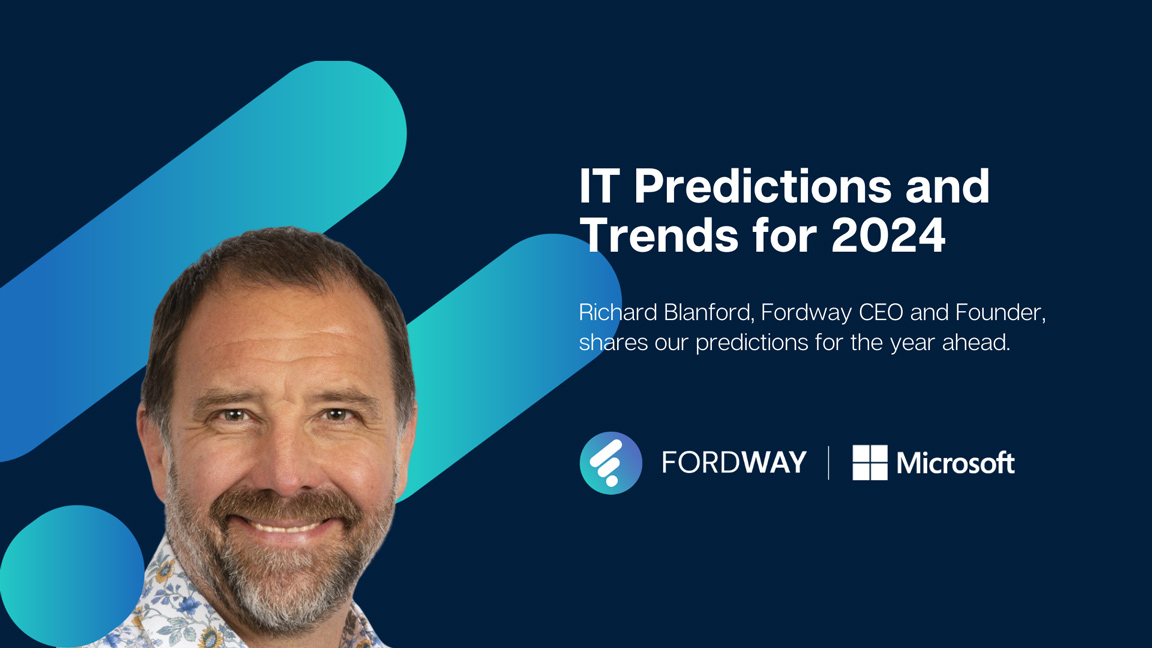With the festive season imminent and pretty much every house on my road now covered in fairy lights it’s time for our annual predictions of things that we think are likely to happen or become important to our customers in 2024.
Using AI effectively
2024 will be the year that we stop thinking about AI as a ‘thing’ and start using it as part of our everyday lives, in fact we already do.
It can write marketing materials, technical documents, presentations or songs; develop and check code as well as most programmers; and touch up photos to ensure you always present your best image. Expect to see a proliferation of custom AI assistants, a.k.a. bots, to help with everyday activities through your favourite app stores, social media sites and search engines. Some of these may even be worthwhile and useful.
Paying for AI
Whilst AI is potentially immensely beneficial, and potentially very dangerous in the wrong hands, it requires a vast amount of expensive hardware to operate, that needs to be paid for in some way.
Microsoft are leading the charge with their chargeable Copilot services; Google, Meta and others are not far behind, at the moment their services are ‘free’. Even if you are not asked to pay for these services, you will be paying in some way; beware of the old adage, ‘if the product is free, you (or more specifically your data) are the product’.
Net Zero and Sustainability
As noted above, one of the major issues for AI is that it is massively compute intensive, both to develop and train the models and to provide the services.
Current estimates are that using AI to generate a three paragraph response to a question uses approximately 80 times the computing power than to respond to a ‘traditional’ search request to direct you to a suitable web page, and to create an AI generated image uses around 450 times the power needed to search for an existing image.
Apart from these massive increases in computing power to provide these replies, all these additional computers need to be built and shipped, using raw materials and energy intensive manufacturing processes, and housed in datacentres which need to be built with associated HVAC and facilities.
It is extremely unlikely that all the electricity needed for this, at least initially, will be generated from renewable or low carbon sources, and these workloads are additional to current computing requirements, not replacement.
Security
Data Security, along with identity, authentication and access, has been a perennial issue over the past few years, and in 2024 it will continue to be at or near the top of every IT team’s issues list.
The key reason is that unlike a migration or implementing new tools, security is not a do it then optimise issue; organisations need to be focused on it 24 hours a day, 7 days a week, and perfection is the only acceptable outcome.
An ignored alert, missed patching cycle or poorly implemented upgrade could create the opening the bad guys need. If you are unable to monitor your environment 24 x 7 x 365 yourselves and understand exactly what is happening at any given moment, contract someone who will do it for you, it’s that important. Security is Fordway’s core business, we’re here to help.
Cloud data sovereignty
We’re not arrogant enough to say that the wars, upheavals and political uncertainty in 2023 herald the end of globalisation, but they are all causing countries and organisations to look to secure and shorten supply chains, reduce trust among partners and look closer to home for answers.
Many countries, even within friendly trading blocks, are introducing more controls on where their citizens data can be stored and processed, and who can access it. Another factor is the fairness of the taxation system, where global entities get to ‘choose’ where and how much tax they pay.
Whilst the hyperscalers are offering various types of ‘sovereign’ clouds, expect to see governments backing and promoting national and bloc-specific cloud champions, witness Germany’s recently toughened data sovereignty laws and the EU’s £1.2 Billion commitment to help local providers develop a European rival to AWS, Azure and Google.
Virtual reality and the metaverse
Whilst there will be large amount of noise about 2024 being the ‘year of the metaverse’ from interested parties such as Meta, Apple and others, we don’t see a killer application or use case for it outside of training and gaming. Personally, my bet is 2030 will be the actual year of the metaverse, and, just like AI, we’ll all be using it without realising. It will also need more enormous amounts of computing power to run it…
I’m sure there will be dozens more that we’ve missed, as usual let’s revisit this these at the end of 2024 and see how we did. In the meantime, we wish all our customers, staff, suppliers and readers a very Merry Christmas and a happy and prosperous 2024.
By Richard Blanford
CEO and founder, Fordway
Accelerate your digital transformation
Clients that work with us can transform their daily operations and develop their future (with new architecture, new systems, new technologies) to improve their processes, increase productivity and deliver high-quality user experiences.




